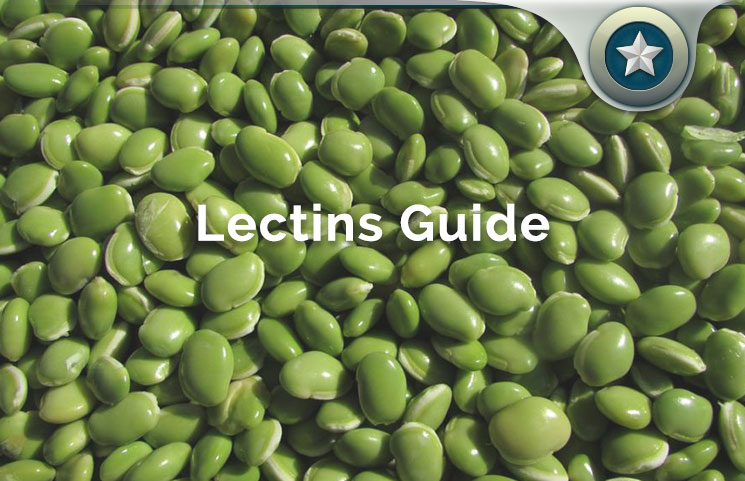Lately, there’s been a lot more emphasis on the consumption of organic and natural foods as one of the crucial components of a healthy eating lifestyle.
This is not surprising seeing as plants and organic foods have been linked to weight loss, eliminating certain digestive problems, reversing certain metabolic problems, and even improving one’s looks as one ages.
In certain quarters, the more organic and closer to raw the plants or foods are, the better. In fact, certain diets like the raw fruit diet are modeled after these theories, with great results too.
The unfortunate thing however, is that it is possible to harm your health even while losing weight and eating healthy. This is because certain plant based foods can also be harmful to your health particularly when they contain certain substances.
These substances, some of them in the form of plant proteins, are actually designed to protect the plant from consumption. One of these proteins is lectin. Its consumption has been on the rise and has resulted in widespread digestive and cardiovascular related conditions.
This is all possible according to Dr. Steven R. Gundry, a Yale trained, and highly renowned cardiothoracic surgeon who invented many medical devices used across the globe today. In Dr. Gundry’s new book, The Plant Paradox, he posits that some plants don’t want to be eaten.
These plants tend to contain high amounts of lectin. And seeing as lectin is present in varying quantities in most plants, you can be sure that your veggies and fruits aren’t as safe or as healthy as you thought they were.
Who’da thought that we’d one day be wary of eating our salads, nuts and beans huh?! After all the work that went into getting people to adopt fruits, nuts and veggies as a part of their daily diet, you’d think we’d be healthier. Instead, people are coming down with all sorts of digestive inflammation and cardiovascular health problems courtesy of this one protein called lectin.
In case you didn’t know, gluten is a form of lectin, even if a minor one. Surprised, eh? No wonder gluten has been linked to many digestive inflammation problems. Yet, the average individual consumes more lectin than is good for their body. In this short guide to lectins, we’ll cover the following:
- What Are Lectins
- Food Sources of Lectin
- How Can They be Dangerous to Your Health?
- How to Reduce or Eliminate Lectin Content in Your Foods

What Are Lectins?
Have you ever finished eating a meal and felt weak and tired? We’re not talking about heavy, white flour-filled, carb laden meals. We’re talking moderate sized, healthy, organic meals with a decent sized amount of veggies and fruits as dessert.
If you have, chances are you ate food that had huge amounts of Lectins in them. Lectins consumed in sizable quantities can actually mess with your hormones. For instance, research has shown that when animals eat foods with lots of Lectin in them, they tend to become “sad”, and lethargic.
While animals can’t do anything about this and just wait for the side effects to wear off, us humans, just take some sort of medication to get us up and going again. These are just a few of the reasons why Lectins are classified as toxic food agents.
Lectins are essentially carbohydrate binding proteins readily available in nature. In fact, Lectins aren’t just commonly found in many plants, they are also found in humans.
While the naturally occurring lectin proteins in man does help our immune systems, Lectins in plants play a largely protective role, particularly in the seeds of plants. It’s as if they are hard coded to protect the seed and ensure the continuation of the plant species.
While Lectins as a whole aren’t bad –there are some good ones that are beneficial when taken in smaller amounts- a considerable part of those found in certain plants can be dangerous to your health.
In fact, research shows that about 30 percent of all the foods we consume contain significantly higher and therefore, dangerous quantities of Lectins. For instance, Lectins can affect your health by triggering a condition called Gut Dysbiosis, a situation where your digestive bacteria are overfed and react against your body.
This is why digestive problems and inflammation are often linked to the ingestion of lectin rich plants. Seeds rich in Lectins are typically hard to chew or breakdown. This is why the seeds tend to pass through your gut undigested and excreted whole.
They are also known for causing significant damage to gut cells, by reacting with the gut lining. This is what often causes the condition known as leaky gut, where toxins from the stomach pass through the stomach lining and into the blood.
The result of having leaky gut is the development of several health conditions, some of which include system-wide inflammation, autoimmune diseases, cardiovascular disease, metabolic syndrome, arteriosclerosis, weakened immune system and many other health conditions.
The two major classes of Lectins that can trigger these conditions are:
- Agglutinins
- Prolamins – This is the parent class of gluten
Agglutinins are so called because of their ability to combine/merge blood cells (agglutinate), resulting in blood clots, which can be incredibly dangerous in certain parts of the body.
Some examples of agglutinins include the kidney bean lectin, soybean lectin and wheat germ agglutinin. When you have a combination of agglutinin and prolamin present in your stomach, they trigger a population explosion of the E.Coli bacteria, which causes severe stomach discomfort.
Food Sources of Lectins
The major sources of Lectins in plants are found in legumes and grains. While they are generally present in some of these food sources, you need to understand that their concentration and activity can be impaired or weakened by the processes of cooking.
However, there are legumes with Lectins that survive even the most brutal of cooking processes. These legumes are said to have a biologically active lectin, even after all the cooking processes. These are the most dangerous ones to eat.
Some of the legumes whose Lectins can be deactivated by the cooking process include brown beans, snow peas, sugar snap peas, cow peas, sweet peas and green beans. Some of the tougher ones with Lectins that can’t seem to be deactivated by the cooking process include dried kidney beans, soy beans and peanuts.
Other food categories include plants belonging to the nightshade family, sea foods, and dairy. Some other examples of these include tomatoes, lentils, and potatoes.
A more comprehensive list of beans with significant quantities of lectin include lima beans, fava beans, pinto beans, string beans, castor beans and wax beans. This is why when you eat huge helpings of any beans, you’ll most likely develop a case of the farts, bloating and diarrhea.
As for grains containing significant amounts of Lectins, these include wheat, corn, rice, and barley. Wheat’s Lectins are courtesy of the aforementioned wheat germs which are often high in agglutinins, and hardly ever digested by the stomach. Cereals made from these foods also tend to contain decent amounts of Lectins.
Fruits and veggies that often have high amounts of Lectins include carrots, zucchini, asparagus, cucumber, turnips, radish, sweet pepper, beet and rhubarb. You’ll also find Lectins in oranges, strawberries, raspberries, blackberries, grapes, lemons, pomegranates, watermelon, apples, cherries, blackcurrants and papaya.
How to Remove or Minimize Lectins from Your Foods
Now, just because you have Lectins in just about every plant on earth, doesn’t mean you get to stop eating. Our ancestors figured this out pretty quickly, hence the reason they started cooking most of their meals.
Cooking using heat was a necessity, something they had to do to literally survive. Getting rid of Lectins from your daily meals involve first identifying those foods with lower quantities of Lectins in them.
Then, cooking them for a decent amount of time. For instance, cooking soybeans for just 5-10 minutes drastically reduces its lectin content to about 1 percent of its pre-cooked volume. Even at this small amount, it’s still pretty potent.
This is why you shouldn’t consume them in very high quantities as they can still cause some discomfort. Other effective ways to degrade and reduce the amount of Lectins in your foods include soaking, sprouting and even fermenting them.
This particularly works for stubborn legumes like navy beans which still contains significant lectin quantities even after cooking for a while. Fermenting these foods work because the friendly bacteria in them tend to digest and remove the Lectins, resulting in a Lectin free grain or legume.
This is probably why whole grains prepared using the fermentation method tend to be healthier. Who knows, if all the grain related health problems we’re currently battling is because we have stopped fermenting these foods properly before processing and packaging them.
Now that you are familiar with Lectins, it’s time to take a look at your pantry and see if you have foods that contain substantial amounts of the protein. Who knows, maybe eliminating Lectins from your meals can help drastically improve your health as opined by Dr. Gundry in his new book, The Plant Paradox. Whatever the case, go do a lectin cleanse today, so you can enjoy better health.









